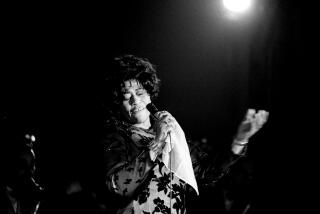JAZZ SPOTLIGHT : *** 1/2 ELLIS & BRANFORD MARSALIS : “Loved Ones”, Columbia
- Share via
A collection of romantic ballads performed by saxophone and piano, sans rhythm section, is not necessarily the stuff of which effective jazz recordings are made. Yet that’s precisely the route that the father and the eldest son of the Marsalis clan (with production supervision from another brother, Delfeayo) have taken to arrive at one of the most appealing CDs of the year.
Give part of the credit to the simplicity and the directness of Ellis Marsalis’ concept: an album dedicated to “the romantic effect of ladies upon American songwriters” via a compilation of such tunes as “Laura,” “Stella by Starlight,” “Sweet Lorraine,” “Lulu’s Back in Town,” etc. It’s hard to go wrong with love songs provided by Victor Young, Leonard Bernstein, Duke Ellington and Cole Porter (and perhaps inspired by a similar alliance between Ellis and his son Wynton Marsalis in the late ‘80s album “Standard Time, Vol 3”).
And give the balance of the credit to the warm camaraderie of the father-son musical connection. Originally planning to do a solo outing, Ellis Marsalis decided, instead, that the ballad concept could best be expressed with the added voice of a saxophone--specifically, his son’s soprano and tenor. It was a good decision, but one with implicit possible problems, given both the age differences and the inherent potential for father-son discord.
Even a brief hearing of the album, however, discloses no such obstacles. None of the music is pushed, none of the interaction is confrontational. Instead, there is a constant feeling of joint musical and emotional acceptance between the two players. Whatever generational differences may exist are set aside, as each finds a way to link with the other.
Branford Marsalis’ open, uncluttered performances are particularly welcome after the 15-second sound bites that made up the bulk of his work when he was the music director on “The Tonight Show,” followed by a stint with his jazz/hip-hop group Buckshot LeFonque. Although he often plays choruses that spin off the melody--a more demanding practice (to do right) than one might assume--his tenor saxophone solos on “Stella by Starlight” and “Liza,” and his soprano work on “Laura” reveal how much creative capability remains to be explored in his music.
His father’s playing is similarly illuminating. Honored as the patriarch of what has been called the “First Family of Jazz,” he has been too little appreciated for the high quality of his own skills. Fortunately, a few tunes--Young’s “Delilah,” Porter’s “Miss Otis Regrets,” “Nancy (With the Laughing Face)” and an original “Dear Dolores” (for his wife)--are done as solos, allowing Marsalis to showcase a talent that has less to do with pianistic virtuosity than with insight and imagination. Equally impressive, he both supports Branford’s lines (listen to the chording on “Laura”) and pulls him in directions the younger player might not choose on his own (the bouncy, stride-based rendering of “Sweet Lorraine”).
More to Read
The biggest entertainment stories
Get our big stories about Hollywood, film, television, music, arts, culture and more right in your inbox as soon as they publish.
You may occasionally receive promotional content from the Los Angeles Times.










